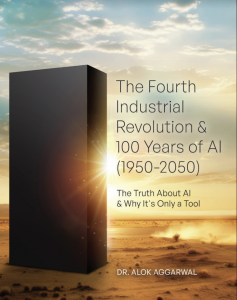
New book from Alok Aggarwal explores the impact of AI on global health challenges and the emerging field of personalized medicine
SAN JOSE, CALIFORNIA, USA, March 19, 2024 /EINPresswire.com/ — Alok Aggarwal’s new book, “The Fourth Industrial Revolution & 100 Years of AI (1950-2050),” explores the impact of Artificial Intelligence on all aspects of our economy, including how it will enhance the cause of global health and medicine.
Indeed, CRISPR, an abbreviation for ‘Clustered Regularly Interspaced Short Palindromic Repeats,’ has emerged as a game-changer in gene editing, proving highly efficient and cost-effective. It stands as one of the key inventions of the fourth industrial revolution, alongside advancements such as automated prediction of protein folding, innovative materials and drug discovery, and improved techniques for personalized medicine.
The tenth chapter titled, “For Gene Editing, Protein Folding, New Materials, and Personalized Medicine” discusses key inventions in this field and how Data Science and AI are being used to enhance them. For example, Malaria, a devastating mosquito-borne disease, has long posed a significant global health challenge. In a groundbreaking discovery in 2017, researchers at John Hopkins University identified a gene in Anopheles mosquitoes that, when deleted, renders them resistant to Malaria parasites. Using CRISPR, this breakthrough has the potential to significantly curb the transmission of Malaria, as fewer mosquitoes with the ability to host the Malaria parasite are produced.
The following are some of the key takeaways from this chapter:
• CRISPR-Cas9 is efficient and effective for gene-editing: CRISPR-Cas9 has made gene editing extremely efficient, effective, and inexpensive. This has allowed gene editing to be used widely for many applications including those related to new medicines, genetically modified organisms, new agricultural products, and in controlling pathogens and pests.
• Datasets and AI systems are improving CRISPR and solving the protein folding problem: AI techniques are already being used by researchers to make CRISPR even better and more useful. Similarly, AI techniques – particularly two Deep Learning Networks, AlphaFold and RoseTTAFold – have solved the protein folding problem almost entirely, which will be immensely useful in Biology and Medicine.
• Enormous datasets and AI systems are also reducing the time to find new materials: The availability of enormous data and AI techniques are helping investigators in identifying new molecules and drugs with specifically desired properties, which is a core challenge for medical doctors, chemists, and materials’ scientists. Such new molecules are likely to lead to more effective and less toxic medicines, green chemicals for combating climate change, and novel materials for use in construction, 3D printing, and electronics’ industries. Certainly, finding new molecules with specific properties is one of the most challenging problems because as input, there are 118 elements in the Periodic Table that can be potentially combined in numerous ways, whereas the output must satisfy many desired properties, each with its range and features. Hence the use of AI is crucially valuable in finding such materials.
• AI technology is helping in Medicine: It is particularly helping in drug design, polypharmacology, chemical synthesis, drug repurposing, drug screening, predicting toxicity, and in improving clinical trials. In addition to exploiting AI for drug discovery, researchers and practitioners are also using it for optimizing drug dosage, product development, and drug manufacturing. Hence, substantial research and engineering effort is already being expanded but more is required so that these areas develop rapidly.
• Since the potential uses of AI in drug discovery, development, and delivery are numerous and can save pharmaceutical companies billions of US Dollars, according to OECD Publishing, startups in the healthcare, drugs, and biotechnology sector related to AI received 12 billion US Dollars (16% of the total funding) in 2020, with a substantial portion of investments used for mitigating Covid-19 pandemic that started in December 2019.
• Although the use of AI systems for the inventions discussed Chapter 8 are still nascent, they are likely to mature during the next fifteen years and their effects would be far and wide, particularly because they will be able to help medical and material scientists in finding novel drugs and other materials quicker, better, and less expensively. During this period, human society will need to deal with a plethora of issues related to ethics and regulations, which is likely to be a herculean task.
Overall, the book, “The Fourth Industrial Revolution & 100 Years of AI (1950-2050)” provides a concise yet comprehensive exploration of AI, covering its origins, evolutionary trajectory, and its potential ubiquity during the next 27 years. Beginning with an introduction to the fundamental concepts of AI, subsequent chapters delve into its transformative journey with an in-depth analysis of achievements of AI, with a special focus on the potential for job loss and gain. The latter portions of the book examine the limitations of AI, the pivotal role of data in enabling accurate AI systems, and the concept of “good” AI systems. It concludes by contemplating the future of AI, addressing the limitations of classical computing, and exploring alternative technologies (such as Quantum. Photonics, Graphene, and Neuromorphic computing) for ongoing advancements in the field. This book is now available in bookstores and online retailers in Kindle, paperback, and hard cover formats.
About the Author: Dr. Aggarwal is the founder, CEO, and Chief Data Scientist of Scry AI, which provides innovative AI-based products, solutions, and services to enterprises across the globe. Before starting Scry AI, he co-founded Evalueserve (www.evalueserve.com) which provides research and analytics services worldwide. He received his Ph. D. from Johns Hopkins University and worked at IBM’s T. J. Watson Research Center during 1984 and 2000. He has written more than 120 research articles and has been granted eight patents. For more information, please visit: www.scryai.com
Alok Aggarwal
Scry AI, Inc.
+1 9149804717
email us here
Visit us on social media:
Facebook
Twitter
LinkedIn
Instagram
YouTube
![]()
Originally published at https://www.einpresswire.com/article/696794823/artificial-intelligence-s-impact-on-gene-editing-protein-folding-and-personalized-medicine



